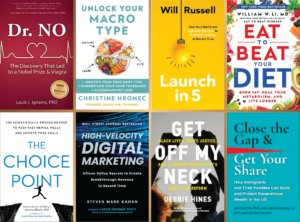My Rebuttal: Why DEI Is Good For Publishing

Share
I received an email from a subscriber regarding my podcast interview with Carrie Bloxson, the VP of Diversity, Equity, and Inclusion (DEI) at Hachette Book Group.
Their opinion: stop this DEI nonsense. We should “let writers succeed or fail based on their merits.” I agree. That’s exactly what we should do.
The question remains: what constitutes merit, and who gets to decide?
So far, the “who gets to decide” what has merit for publishing primarily has been white, upper middle class men and women.
And as to the basis for merit, historically, those criteria have been opaque, but have tended to favor white male authors.
Is merit based on high volumes of book sales? Awards? Pedigree? Mad writing skills?
Surely, if you look, you will find plenty of examples of traditionally published authors who have all, some, or none of these.
And might we also assign merit to the books that add unfamiliar perspectives, or reveal new solutions to old problems that the current body of work has yet to provide?
Publishing has long considered its role in shaping culture a sacred covenant. But if the industry continues “business as usual,” it will miss the opportunity to shape our future.
Traditional Publishing Has Been Traditionally White
Few would deny that the publishing industry has been white-dominant in all areas (publishing/editorial, agenting, and authorship) since its inception.
We’ve known this for a long time.
Publishing has only recently begun to see that this lack of diversity poses a fundamental threat to its survival. The demographics of the United States is changing. The white share of the US population has been in a steady decline since the 1950s.
The publishing industry is way, way behind in adapting to these changes. The percentage of books published by white male authors still outweighs everyone else to such a degree, the industry is choking itself out.
Recognizing the threat, many publishers are becoming proactive in fostering equity in publishing–to invite more voices and bring forth a greater diversity of experience and point of view. In my view, this isn’t about changing the demographics of who gets published to assuage white guilt. It’s about ensuring that publishing itself survives and thrives in the 21st century and beyond.
Voyeurs and Seekers
A reader of books is at least one of two things: voyeur and/or seeker. These qualities exist regardless of the reader’s race or any preference or background.
Voyeurs enrich their inner world by peeking into the experiences of others whose lives are vastly different from their own. They gain nourishment from learning divergent perspectives and ways of doing things.
Voyeurs already are inclined to want more books by authors whose lives they know nothing about. So why not invite more value by inviting in more indigenous peoples, LGBTQ, Black, brown, Asian, and other perspectives?
Seekers turn to books to gain a greater understanding of themselves and discover new ways to solve problems in the world they know and live in.
This is where publishing is failing not only non-white, but women and LGBTQ readers as well. All of whom have had to choose among books mostly written from the cis heterosexual white male perspective. And it’s likely they crave more books by authors whose experience they can relate to.
Why would a seeker be excited to buy more books when the vast majority of the authors writing them don’t share their experience? When the selection is mostly limited to books by authors whose realities growing up, working, and living in this world are so radically different from their own, that they can’t see themselves in the work? Where they don’t feel seen by the author at all?
Seekers Need to See Themselves in Books
If you are looking through the lens of a heterosexual white male who’s had the luxury of a lifetime where 75% or more of the books published were written by people just like you, maybe you can’t even imagine what it might be like for someone else, even your white wife, to read these books and do the mental gymnastics of trying to see how the content applies to their own experience and still maintain a sense of self-empowerment, validation, and worthiness.
Think of how many books, fiction and nonfiction alike, have not only failed to relate to women, people of color, and other marginalized groups but have actually demeaned them and their experiences.
Go back and read all the books assigned in high school English and history, and imagine yourself reading them as a 17-year-old girl of any color, and see what it does to your self-esteem, to what you imagine is possible for your life.
Would you buy those books? Maybe some. But I bet you’d buy more if you got to choose from a wider selection targeted directly to your experience, written by relatable authors who give you the sense that they “get” you.
Equal Opportunity Does Not Yet Exist
It’s easy to look down from the ivory tower of white male privilege and say, “let equal opportunity take care of it.”
The farther you get away from on-the-ground experience, the more “equal” things look.
But the fact is, it’s not equal. It’s never been equal, and people are waking up.
Over time, readers (even white male ones) will have less and less tolerance for the monotone of the white, masculine voice. If publishing fails to add color, new tones, and melodies to its body of work, it is sure to spend the remainder of this century sputtering toward its demise.
I support proactive changes in publishing to make it possible for young people who don’t come from wealthy families to say “Yes” to job offers from New York City-based publishing houses, because the pay is high enough that they can take the position without needing a subsidy from daddy’s trust fund.
I support publishers recognizing that there are several, huge, untapped markets hungry for books that speak from a place of real understanding that only a shared experience can create, and signing new authors from all sorts of backgrounds and perspectives whose books will enrich all our lives.
The Bottom Line is this:
Publishing is not a charity, and I promise you the Big 5 and other publishers who are taking steps to open doors to those who previously have been shut out are not doing it as a handout. They are doing it because it’s good for business. It just so happens, that this time, it’s also good for humanity.



